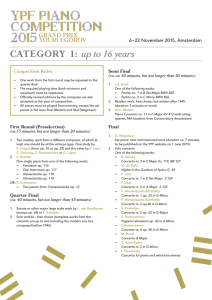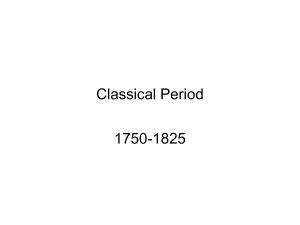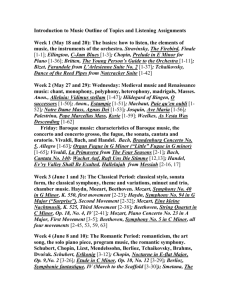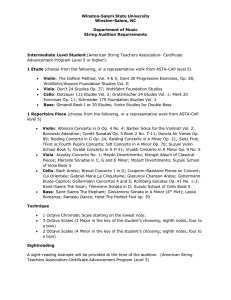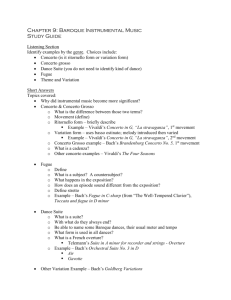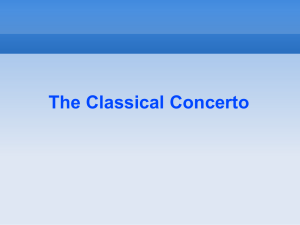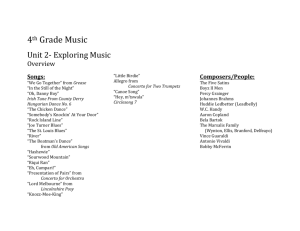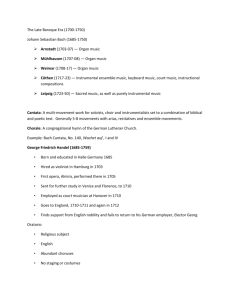-
advertisement
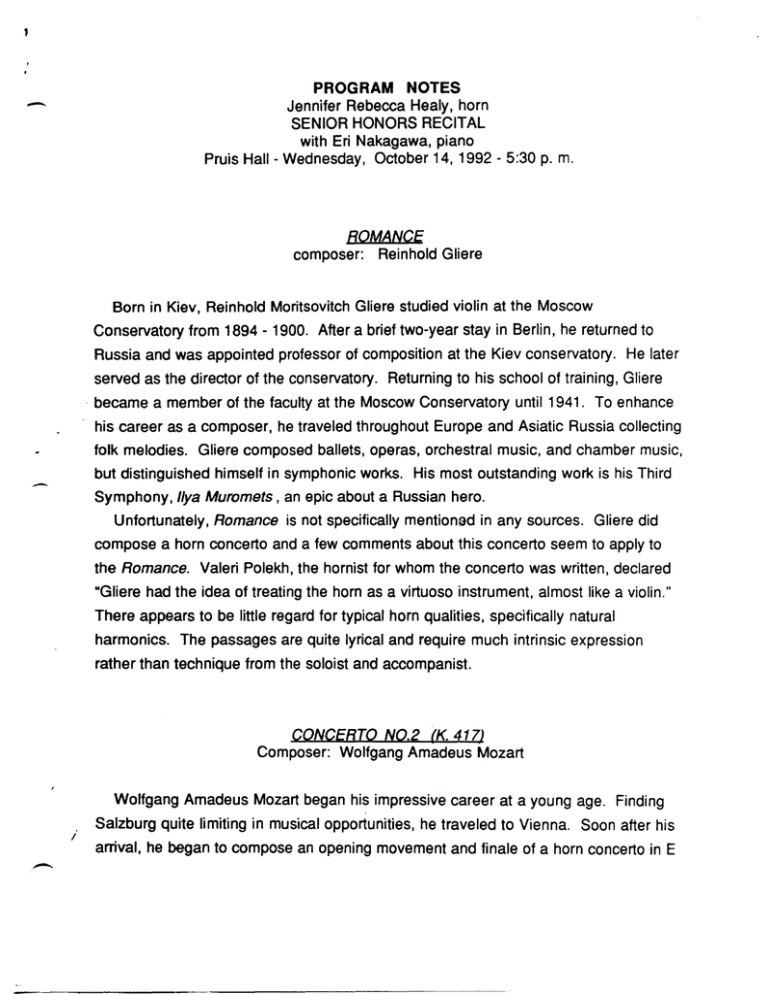
- PROGRAM NOTES Jennifer Rebecca Healy, horn SENIOR HONORS RECITAL with Eri Nakagawa, piano Pruis Hall- Wednesday, October 14,1992 - 5:30 p. m. ROMANCE composer: Reinhold Gliere Born in Kiev, Reinhold Moritsovitch Gliere studied violin at the Moscow Conservatory from 1894 - 1900. After a brief two-year stay in Berlin, he returned to Russia and was appointed professor of composition at the Kiev conservatory. He later served as the director of the conservatory. Returning to his school of training, Gliere . became a member of the faculty at the Moscow Conservatory until 1941. To enhance his career as a composer, he traveled throughout Europe and Asiatic Russia collecting folk melodies. Gliere composed ballets, operas, orchestral music, and chamber music, - but distinguished himself in symphonic works. His most outstanding work is his Third Symphony, I/ya Muromets , an epic about a Russian hero. Unfortunately, Romance is not specifically mentioned in any sources. Gliere did compose a horn concerto and a few comments about this concerto seem to apply to the Romance. Valeri Polekh, the hornist for whom the concerto was written, declared "Gliere had the idea of treating the horn as a virtuoso instrument, almost like a violin." There appears to be little regard for typical horn qualities, specifically natural harmonics. The passages are quite lyrical and require much intrinsic expression rather than technique from the soloist and accompaniSt. CONCERTO NO,2 (K. 417) Composer: Wolfgang Amadeus Mozart Wolfgang Amadeus Mozart began his impressive career at a young age. Finding Salzburg quite limiting in musical opportunities, he traveled to Vienna. Soon after his - I arrival, he began to compose an opening movement and finale of a horn concerto in E Sp,20 l ! 1,;~'...<:: t\ ~U ~t.; S'~f .-::.4 - flat. He abandoned this sketch and did not complete his first horn concerto until May, ' j.'J1f?27,1783. Before the concerto is specifically addressed, a clarification about the "horn" should be discussed. The modern valve horn did not exist in Mozart's time. Mozart composed four "Waldhorn" or hunting horn concertos. Also called the hand-horn or natural horn, this type of horn had no valves. If a pitch other than the natural tones of the Waldhorn was notated, the hornist had to move his right hand into the bell to achieve the desired note. This changes the pitch and the tone quality of the note. Contrary to the traditional numbered order of the concertos, Concerto No.2 in E flat (K. 417) is actually Mozart'slim horn concerto. The other concertos have quite mysterious backgrounds. Experts are not sure if movements in certain concertos belong together. Whether Mozart actually wrote the other concertos is questionable also. Mozart entered concerto (K. 417) into his Verzeichnuss , a little catalogue of his finished compositions from February 1784 until his death. All of th.e concertos were written for his friend Joseph Leutgeb (Leitgeb), a cheese monger in Vienna. Leutgeb had the honor of having these concertos written for him. - In addition, he became the receiver of Mozart's rude jokes. At the top of concerto (K.417) Mozart wrote, " Leitgeb Esel" in red crayon ("Esel" is German for donkey). Continuing his arrogance, he wrote, "Wolfgang Amade Mozart has taken pity on Leutgeb ass, ox, and fool, in Vienna on 27 May 1783." Mozart truly gave Leutgeb a difficult time not only in snide comments, but in the technical difficulty of the piece for hand-horn and the range of the concerto. CONCERTO NO.1 Composer: Richard Strauss Richard Strauss became a talented young composer at an early age. He composed operas, Lieder, concertos, chamber music, tone poems, sonatas, etc.. At I - the age of twelve he wrote his first work Festmarch (1876). At the age of eighteen, he finished his first horn concerto. Strauss grew up listening to his father, Franz Strauss, play the horn. Therefore it , ) - was inevitable that Richard would compose for the horn. This Concerto No.1 was specifically named "Richard Strauss's Waldhorn Concerto". This title is possibly a joke. Due to the technical difficulty of this concerto, could this really have been played on the natural horn? Even Franz Strauss found the solo extremely difficult. The elder Strauss thought the solo too risky to perform in public. In this piece, Strauss uses Naturmotive to connect the entire concerto. The opening fanfare serves as a framework for the first movement and is transformed into 6/8 rhythm in the Rondo of the finale. Similarly, the opening melody in the first movement is connected with the second subjects of the other movements. Clearly, this concerto is challenging for the soloist and definitely gives the accompanist(s) more than an "accompanying" role. NOCTURNE Composer: Gunther Schuller - Born in 1925, Gunther Schuller is a self - taught musician and composer. He performed his own horn concerto with the Cincinnati Orchestra. Although he was the first chair horn player at the Metropolitan Opera for many years, Schuller shares a love for all types of music Uazz, Japanese, medieval). Schuller has composed orchestral, chamber works, and for obscure combinations of instruments. The Nocturne is actually a movement of his horn concerto. It is possible that this movement was not played at the premiere. The rights were obtained by Mills Music and the piece was published for horn and piano. If Schuller had sold the rights before the premiere, legally he could not have performed that movement. In 1980, Mills Music gave up the rights and the concerto is now complete. I - Preparation and Reflection: Senior Honors Recital by Jennifer Healy Finally, my senior year of college. In retrospect, the years went by so quickly. Now, I have earned the privilege of coasting through my final semester of classes and working at my horn playing. But, wait!! The Honors College requires a "final farewell" -- the Honors Thesis! Project. At first, the thought of tackling the thesis/ project struck fear in my heart. Then, to my relief, I found that I could incorporate the horn into my project. This "preparation and reflection" paper will describe my preparations before the recital (Le. music selection, feelings from individual practice and rehearsals with my accompanist) aod reflections after my recital ( i.e. feelings about the performance, regrets, positive aspects). - As I described in the introductory paragraph, I was relieved that I could perform a recital on my horn to fulfill the honors requirement. That Fall semester, I wanted to focus more on my playing anyway! My next endeavor was to choose the pieces. Luckily, Dr. Ehnes had many suggestions and a studio full of horn literature. Several factors influenced the final program arrangement. First, time was definitely of utmost importance. If the recital lasted too long, chop fatigue and audience attentiveness would be a problem. As a hornist, I still needed to cover some "standard literature", mainly Strauss and Mozart. Since both Strauss' Concerto No.1 and Mozart's Concerto No.2 are fairly lengthy, I needed two shorter, less taxing pieces. The Romance by Gliere provided a perfect addition. Although I normally avoid "strange-sounding" pieces, Dr. Ehnes suggested that I consider Nocturne by Schuller. This piece was also shorter in I length and not terribly taxing. -2- The order of the program basically fell into place. Although it is not a flashy piece, the Romance opened my recital excellently. It displayed my greatest strength as a hornist, my tone, and warmed-up my lips gradually. Concerto No.2 by Mozart was my weakest piece during rehearsals. Therefore, it was placed before the intermission partially for that reason. In addition, I could not play two concertos in the same halfl Since I needed to end with an exciting piece, Concerto No. 1 by Strauss was perfect. Nocturne opened the second half without tiring me before the Strauss. The Nocturne also brought a refreshing change of sound to the recital. Next, with my program decided, the rehearsals began: My individual practice was both quite rewarding and frustrating. Naturally, the productive practices and lessons were exciting and encouraged me to continue with the current pattern. Unfortunately, horn playing is not that predictable. Less than ideal conditions, including tired lips from other rehearsals, tiredness in general, dry lips, lips and fingers not cooperating, etc., all contributed to the less than desirable practices. Fortunately, Dr. Ehnes continued his positive teaching methods and I began to approach those frustrating practices with a new attitude. Mentally, I created "Steps to Overcome a Frustrating Practice": 1. This too shall pass. An uplifting rehearsal is just around the corner. 2. If you are miSSing too many notes, you are practicing the passage too fastl Slow down and aim for accuracy. 3. Move that jaw back for those high notesl i 4. Concentrate on the particular high note. Do not just hope for the best. - -3- 5. Focus on one problem at a time. Do not avoid the problem and do not take on many problems at once. 6. As Dr. Ehnes says, use lots of air-- especially when you are tired I With these constant mental reminders, I was able to accomplish more from a seemingly useless practice. I continued this attitude through my rehearsals with Eri Nakagawa, my accompanist. Luckily, with the exception of the Mozart, my pieces were past the frustrating stage technically. I could now focus on the musical aspects. My dress rehearsal arrived too quickly. As I mentioned, most of the pieces progressed well. The Romance posed no technical or range problems: I had a wonderful time making music out of this piece. The Nocturne had some rough - spots in previous rehearsals, but had developed into a truly powerful piece. Concerto No.1 by Strauss still had room for improvement. Overall, I was confident about performing the Strauss for the recital. My weakest and most risky piece technically and range-wise was the Mozart concerto. During my dress rehearsal, Dr. Ehnes and I spent a majority of the time breaking down the technical passages of the Mozart. It improved slightly, but I still was not ready to perform this concerto-- the next dayl On the day of my recital, I attempted to have a "normal" day. Personally, I get very nervous, but not until immediately before I go on stage. People experience and treat nerves in various ways. These are a few thoughts I have on contrOlling my nerves. - I 1. Engage in normal activities before the recital. If someone talks to you, be friendly and acknowledge them. This will keep your brain from thinking about the recital. .- -4- 2. Above all, relax your brain and body. This requires more than normal concentration. 3. Remind yourself that the audience is composed of friends. family. and a few music appreciation students. Therefore, they either already know how you play or they do not carel! This mental process minimizes nerves for me. but does not eliminate theml Finally, the moment arrived. All of those weeks of intense work were displayed in a fleeting hour and a half. In the throws of my recital. it was hard to recall specific moments due to all the emotions. Yet, underneath the nerves. I remember feeling happy. Happy because my friends and family were there. Happy because I would soon acquire some extra time in my schedule. Happybecause my work yielded a respectable performance overall. - In regard to the success of specific pieces. I was surprised at the outcome. Actually, the Romance went as well as it had in the rehearsals. I like the piece because it is very musical and romantic. I missed a few notes. but my tone was full. The Mozart concerto was the nicest surprise. Although it was far from flawless, the concerto sounded much better than it had the night before. In the Nocturne. I started to feel some fatigue. So. I used more air. That technique . definitely saved me from fumbling through the piece. I found that I grew to really love the Nocturne and its mysterious sound. The Strauss concerto was a bit of a disappointment for me. I thought I felt a "second wind" after the Schuller. but I still missed more notes than in past rehearsals. Musically speaking. I felt I could have done more. The "air" technique saved my high 8-flats in all three movements. I missed the first 8-flat because I was not confident and did not I continue the air flow. I was determined not to miss again. Therefore. I did use - -5- more air and it workedl The 8-flats were not solid due to fatigue, but they were there. Clearly, my Senior Honors Recital was a respectable performance and I received many compliments. Personally, I am never quite satisfied until the performance is close to perfect, but I am learning to modify that attitude. A musical performance is not necessarily good because it sounds like a compact disc recording! As long as the musician(s) work hard and pour their soul(s) into the performance, the outcome will be exciting and worth listening to! I am fortunate that the Honors College requires this project. Although uncertainty and reluctancy plagued me in the beginning, the preparations, performance, and reflections allowed me to ponder and delve a little deeper than I might have - otherwise. i
